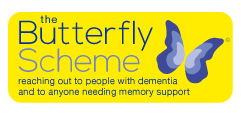Butterfly Scheme Leads across the UK and Ireland agree that whilst the staff teams at good care homes have great insight into the personalisation of care for their residents, very often it’s hard to obtain that information when a resident is hospitalised. Of course, this leaves the hospital team trying to quickly build up a picture of the person needing their care – usually when that person isn’t well, so it can be harder to get to know them. The care home teams, meanwhile, sometimes struggle to know how to deliver that care information to the hospital team – so there’s frustration on both sides, but each certainly has the passion and skill to deliver personalised dementia care.
Over the years, we’ve been trying to nurture good communications between hospital and care home teams, but often the care homes teams don’t realise just how much expertise they have, nor how best to present that to the hospital team. For a long time, we simply spread the word that the hospital teams were keen to liaise with care home teams – but I now see something developing that makes me optimistic for the future: I’ve had a number of care home teams contact me direct, for guidance on how to share their insight and best support smooth transfers in and out of hospital. Fabulous!
In a nutshell, this is what I advise:
-
Ideally, involve the person themselves in deciding whether to opt into the scheme – and involve whoever usually advocates for that person, so that the opt-in decision can be made together before any hospital care is needed. Record the decision and keep details on file so that there is clarity if hospitalisation is needed.
-
Collaboratively fill in the local hospital’s care information sheet – REACH out to Me, This is Me or whichever is the preferred version in use. Keep that on file and take a photocopy to any outpatient appointments.
-
If the person needs to be admitted to hospital, make last-minute amendments to any detail which may have changed, then make a copy of the document and send the copy in with the person. Keep the original at home, so that if the copy goes missing in transit it will be simple to copy again or to scan and email, instead of having to start all over again. Those last-minute changes are so important, because what was true a few weeks ago may well be different now – and teams at Butterfly Scheme hospitals are adept at working in partnership to amend details (with permission) as new insights are gained.
A lovely example of information-sharing came from the Assistant Manager at a care home in Wales, who always includes a note about how many pillows people prefer to have; if you can’t deliver that sort of detail for yourself, imagine the difference that information can make! Thank you to all care home and hospital teams who are working to collaborate – and to all teams doing everything they can to support people living with dementia.
